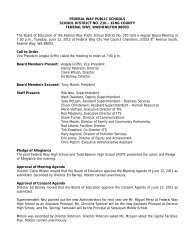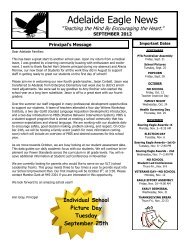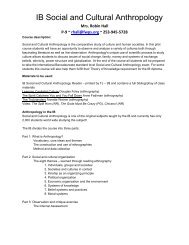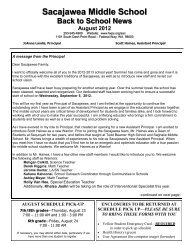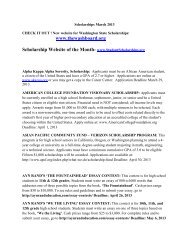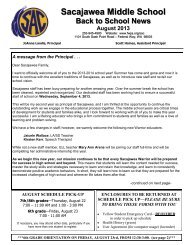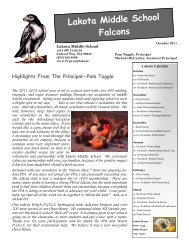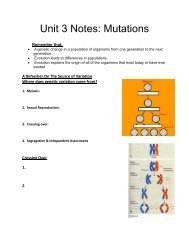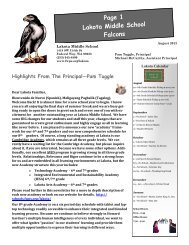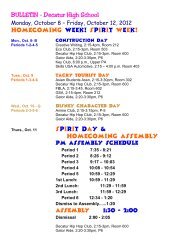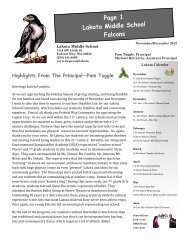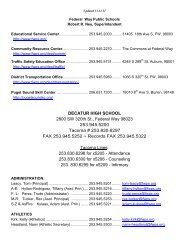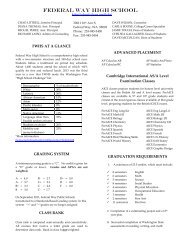High School Book LIst - Federal Way Public Schools
High School Book LIst - Federal Way Public Schools
High School Book LIst - Federal Way Public Schools
You also want an ePaper? Increase the reach of your titles
YUMPU automatically turns print PDFs into web optimized ePapers that Google loves.
Title Author<br />
<strong>High</strong> <strong>School</strong> Supplementary Reading List<br />
Content<br />
Emma Austen, Jane Emma Woodhouse is bright, beautiful, and rich; she is also snobbish and judgmental, and she<br />
can be cruel, with a tendency to interfere in other people's lives. The novel chronicles Emma's<br />
attempts to make a match between a hapless vicar who is, in fact, enamored of Emma<br />
herself, and her friend Harriet, a poor and simple young woman in love with a farmer. Unlike<br />
many of Austen's heroines, Emma is possessed of very little good sense; her absurd<br />
machinations complicate the lives of everyone involved--and, needless to say, get nowhere.<br />
Emma, however, learns from her mistakes and gains some badly needed insight into herself<br />
as she discovers her feelings for the older, steady, aristocratic Mr. Knightley. The novel moves<br />
toward a not unexpected but perfectly satisfying conclusion, and in the process introduces<br />
Austen's usual cast of amusing, pretentious, hypocritical, and/or dim-witted characters,<br />
including the appalling, nouveau riche Mrs. Elton, and Emma's widowed father, one of the<br />
most insufferable (and delightful) neurotics in literature.<br />
Ethan Frome Wharton, Edith In nineteenth-century Starkfield, Massachusetts, a poor young farmer falls in love with the<br />
vivacious Mattie, cousin of his sickly, demanding wife, and starts a devastating chain of<br />
events. Adultery.<br />
Everything‘s An Argument This is a gook centered upon forming strong, persuasive arguments. Topics include<br />
inartistic/artistic appeals to audiences, humor, ethos (credibility), and establishing tone in<br />
writing. Quantitative and qualitative arguments are two examples of the types of arguments<br />
presented in this book. Metaphors, tropes, similes, analogies, and hyperboles are figures of<br />
speech that are presented to help form a credible, strong, and persuasive argument towards a<br />
specific audience.<br />
Fahrenheit 451 Bradbury, Ray In Fahrenheit 451, Ray Bradbury's classic, frightening vision of the future, firemen don't put out<br />
fires--they start them in order to burn books. Irony and satire are Bradbury‘s tools in this<br />
classic novel. Profanity.<br />
Fallen Angels Myers, Walter Dean Richie Perry, Lobel, Johnson, Brunner, and Peewee are all in Vietnam. They came there for<br />
different reasons, but now they share a single dream -- getting out alive. The critically<br />
acclaimed story of one young man's tour of duty in Vietnam and a testament to the thousands<br />
of young people who lived and died during the war. This generation's most powerful Vietnam<br />
story. Depictions of war. Profanity. Use of the "N" word.<br />
Far From the Madening<br />
Crowd<br />
Hardy, Thomas Hardy's first major novel tells the story of the shepherd Gabriel Oak and his long, patient<br />
devotion to Bathsheba Everdene. Bathsheba's faithless husband is murdered by a neighboring<br />
farmer, William Bellwood, who also loves her. At the end of a traumatic series of events,<br />
Bathsheba turns to Gabriel at last, valuing his honesty and integrity. Like Hardy's later novels,<br />
this one is characterized by coincidence, melodrama, and a degree of improbability. It also<br />
emphasizes the role of natural forces--the earth and the rhythms of rural life--all of which are<br />
personified in Gabriel Oak. The novel is less bleak and unforgiving than the later works, and is<br />
remarkable for its insight into the complexities of character, particularly that of the manyfaceted<br />
Bathsheba.<br />
Farewell to Arms Hemingway, Ernest The best American novel to emerge from World War I, A Farewell to Arms is the unforgettable<br />
story of an American ambulance driver on the Italian front and his passion for a beautiful<br />
English nurse. Hemingway's frank portrayal of the love between Lieutenant Henry and<br />
Catherine Barkley, caught in the inexorable sweep of war, glows with an intensity unrivaled in<br />
modern literature, while his description of the German attack on Caporetto -- of lines of fired<br />
men marching in the rain, hungry, weary, and demoralized -- is one of the greatest moments in<br />
literary history. A story of love and pain, of loyalty and desertion, A Farewell to Arms, written<br />
when he was 30 years old, represents a new romanticism for Hemingway. Note: This book<br />
may contain offensive material.<br />
Farewell to Manzanar Houston, Jeanne<br />
Wakatsuki, and<br />
Houston, James D.<br />
<strong>High</strong> <strong>School</strong> 2011-12<br />
During World War II a community called Manzanar was hastily created in the high mountain<br />
desert country of California, east of the Sierras. Its purpose was to house thousands of<br />
Japanese American internees. One of the first families to arrive was the Wakatsukis, who<br />
were ordered to leave their fishing business in Long Beach and take with them only the<br />
belongings they could carry. For Jeanne Wakatsuki, a seven-year-old child, Manzanar<br />
became a way of life in which she struggled and adapted, observed and grew. For her father it<br />
was essentially the end of his live. Violence, racism, and criticism of American government<br />
policy.




